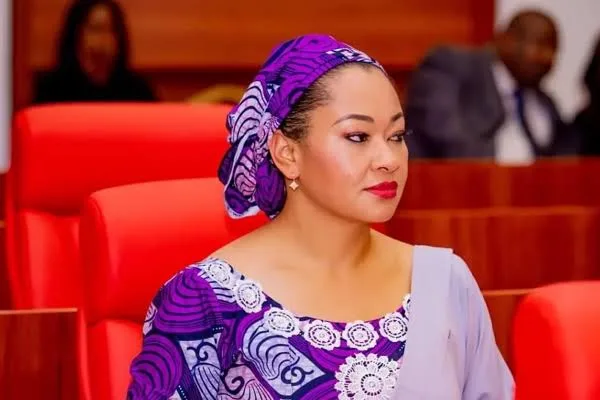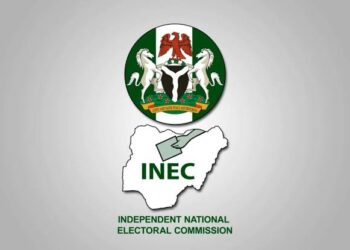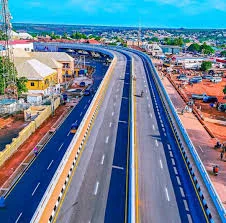The Independent National Electoral Commission (INEC) has notified the suspended Sen. Natasha Akpoti-Uduaghan about the receipt of a petition to recall her from the National Assembly.
The commission disclosed this in a statement issued by Sam Olumekun, INEC National Commissioner and Chairman, Information and Voter Education Committee, on Wednesday in Abuja.
Olumekun also confirmed that further to the statement issued by INEC on Tuesday, the commission had received contact addresses of representatives of the petitioners seeking to recall Natasha.
He stated that the telephone numbers and e-mail addresses of the representatives of the petitioners had been provided to INEC in a letter addressed to the chairman of the commission, dated March 26.
“As provided in Clause 2(a) of the commission’s Regulations and Guidelines for Recall 2024, a letter has been written to notify the senator sought to be recalled about the receipt of the petition and delivered to her official address.
“The same letter has been copied to the presiding officer of the senate and published on the commission’s website.
“The next step is to scrutinise the list of signatories submitted by the petitioners to ascertain that the petition is signed by more than one half (over 50 per cent) of the registered voters in the constituency.
“This will be done in the coming days. The outcome, which will be made public, shall determine the next step to be taken by the commission,’’ he said.
Olumekun re-assured Nigerians that the recall process would be open and transparent.
A group of registered voters from Kogi Central Senatorial District had,on Monday, submitted a petition to INEC, urging the commission to commence the recall process of Akpoti-Uduaghan, Senator representing the senatorial district.
The constituents, in the letter signed by the Lead Petitioner, Salihu Habib, and submitted at INEC headquarters, Abuja on Monday, said they no longer had confidence in Akpoti-Uduaghan as their senator and representative in the National Assembly.
Meanwhile, INEC had, on Tuesday, confirmed the receipt of the petition, accompanied by six bags of documents said to be signatures collected from more than half of the 474,554 registered voters from the senatorial district.
Olumekun said in a statement that the figure was said to have spread across 902 polling units in 57 registration areas (wards) in the five local government areas of Adavi, Ajaokuta, Ogori/Magongo, Okehi and Okene.
He assured Nigerians that the commission would follow its legal framework in treating the recall petition.
Olumekum, however, said that the commission’s immediate observation was that the representatives of the petitioners did not provide their contacts in the covering letter of the petition.
These, he said, included their addresses, telephone numbers and e-mail addresses through which they could be contacted, as provided in Clause 1(f) of the commission’s regulations and guidelines.
“The address given was “Okene, Kogi State”, which is not a definite location for contacting the petitioners.
“Only the telephone number of “the lead petitioner” is provided, as against the numbers of all the other representatives of the petitioners,” Olumekun had said.
2027: Rep seeks measures to strengthen electronic accreditation system Chairman, House of Representatives Committee on Electoral Matters, Rep. Adebayo Balogun, has called for measures to strengthen the electronic accreditation system used during elections.
Balogun made the call at the Situation Room Advocacy Meeting on the criteria for appointments into Independent National Electoral Commission (INEC) and the credibility threshold for the 2027 general elections, on Wednesday in Abuja.
According to the lawmaker, accreditation is the most important aspect of an electoral process.
“Nowadays, any brilliant politician will know that the fear of BVAS is the beginning of wisdom. Those days have gone when you manipulate the number of votes.
“BVAS has come to stay because if you are not accredited, you cannot vote.
“We should put our concern on how we are going to enhance and empower this system of electronic application technology in our elections and also eliminate incidences of vote buying,” he said.
Balogun also called on the participants to look at ways of retaining old hands in INEC who already knew the workings of the system.
“I think one of the areas we can start focusing on is to ensure that some of the old hands are elevated so that we do not have entirely new people coming in during elections,” he said.
He also recommended that an INEC chairman should be appointed from the existing commissioners in the commission.
“Since the person is already in the system, he knows what is on ground and will not need to learn through the ropes,” he said.
Balogun assured the gathering of the committee’s commitment to utilising the recommendations from the meeting.
The Convener of Situation Room, Mr Yunusa Ya’u, said that meeting was aimed at looking beyond the constitution and recommending the qualities and criteria for the appointment of INEC chairman.
Ya’u, who is also and Executive Director, Centre for Information Technology and Development (CITAD), said that the criteria would be used as the basis for assessing the success of the 2027 general elections.
He urged the participants to bring up practicable and workable recommendations.
The Executive Director, Policy and Legislative Advocacy Centre (PLAC), Mr Clement Nwankwo, said it was critical to get people who were non-partisan to be appointed as INEC chairman to ensure credible elections.
According to Nwankwo, who is also a member of the Situation Room, anybody to be appointed should also be well scrutinised and adjudged not to be partisan, even as he called for an upgraded voter register.
The Deputy National Chairman, Inter-Party Advisory Council of Nigeria (IPAC), Mr Dipo Olayokun, said that the appointment of INEC chairman and the commission’s funding should be taken away from the president.’
According to him, it will be technically difficult to get desired elections in the country if the president is allowed to appoint INEC chairman and other members of the commission.
“Maybe this is why we need to revisit the report of the Justice Uwais Committee which has to do with the appointment of people into INEC,” he said.
On his part, the Political Counselor, British High Commission, Mr Tom Burge, said no society could flourish in its democratic governance if the citizens’ rights to free and fair elections were not protected.
Burge, who said that U.K. had been a long standing partner with Nigeria because of the country’s strategic place in Africa, pledged the commission’s support for the electoral process.




